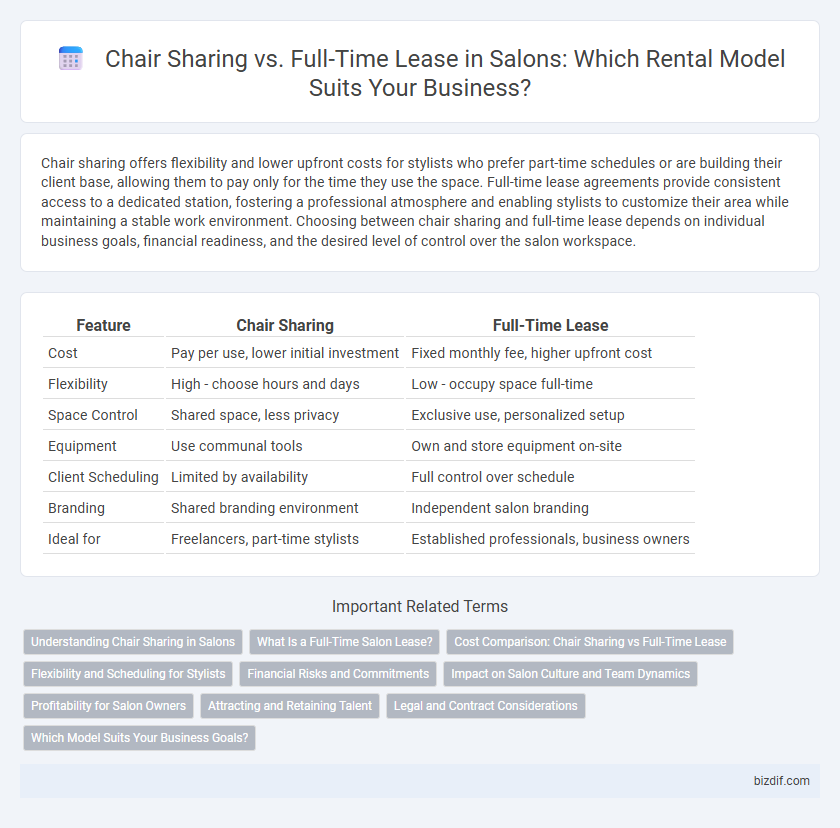Chair sharing offers flexibility and lower upfront costs for stylists who prefer part-time schedules or are building their client base, allowing them to pay only for the time they use the space. Full-time lease agreements provide consistent access to a dedicated station, fostering a professional atmosphere and enabling stylists to customize their area while maintaining a stable work environment. Choosing between chair sharing and full-time lease depends on individual business goals, financial readiness, and the desired level of control over the salon workspace.
Table of Comparison
| Feature | Chair Sharing | Full-Time Lease |
|---|---|---|
| Cost | Pay per use, lower initial investment | Fixed monthly fee, higher upfront cost |
| Flexibility | High - choose hours and days | Low - occupy space full-time |
| Space Control | Shared space, less privacy | Exclusive use, personalized setup |
| Equipment | Use communal tools | Own and store equipment on-site |
| Client Scheduling | Limited by availability | Full control over schedule |
| Branding | Shared branding environment | Independent salon branding |
| Ideal for | Freelancers, part-time stylists | Established professionals, business owners |
Understanding Chair Sharing in Salons
Chair sharing in salons allows multiple hairstylists to rent the same chair during different hours or days, maximizing space usage and reducing overhead costs. This flexible arrangement provides stylists the opportunity to build their clientele without committing to a full-time lease, making it ideal for part-time professionals or newcomers. Understanding chair sharing helps salon owners efficiently manage their floor plan while offering affordable options for stylists seeking workspace.
What Is a Full-Time Salon Lease?
A full-time salon lease involves renting a designated chair or space within a salon for a fixed period, allowing stylists to operate their business independently while benefiting from the salon's infrastructure. Unlike chair sharing, where multiple stylists share a single station and expenses, a full-time lease grants exclusive use and control over the leased area, often including storage and marketing support. This arrangement provides stability and autonomy, enabling professionals to fully customize their services and client schedules within a consistent salon environment.
Cost Comparison: Chair Sharing vs Full-Time Lease
Chair sharing in salons typically offers a lower upfront cost and flexible payment options, making it ideal for stylists seeking to minimize monthly expenses. Full-time leases require fixed monthly rent payments, resulting in higher accountability but potentially greater control over the workspace and client scheduling. Evaluating local salon market rates reveals that chair sharing can reduce costs by 30-50% compared to the average full-time lease price, impacting profitability and financial planning.
Flexibility and Scheduling for Stylists
Chair sharing offers stylists greater flexibility by allowing them to book appointments independently and adjust their schedules based on client demand. Full-time lease arrangements provide consistent workspace access but require commitment to fixed hours, limiting spontaneous changes. Stylists prioritizing adaptability often prefer chair sharing to balance work-life dynamics and client flow efficiently.
Financial Risks and Commitments
Chair sharing offers lower upfront costs and reduced financial risk by allowing stylists to pay only for the hours or days they use the space, making it ideal for those with fluctuating incomes. Full-time lease requires a fixed monthly payment regardless of client flow, increasing financial commitment and potential losses during slow periods. Understanding these differences helps stylists balance flexibility with stability in their salon investments.
Impact on Salon Culture and Team Dynamics
Chair sharing promotes flexibility and fosters a dynamic salon culture by encouraging collaboration and diverse client interactions among stylists. Full-time lease arrangements contribute to stability, allowing stylists to build a consistent personal brand and deeper client relationships, which strengthens team cohesion. Balancing these models impacts overall salon harmony and influences employee satisfaction and retention.
Profitability for Salon Owners
Chair sharing offers salon owners a flexible revenue stream with minimal overhead, as stylists pay a rental fee per shift or day, reducing fixed costs and increasing cash flow. Full-time leases ensure steady, predictable income through set monthly payments, but often require higher upfront investment and ongoing maintenance expenses. Evaluating local market demand and stylist availability helps determine which model maximizes profitability and operational efficiency for salon owners.
Attracting and Retaining Talent
Chair sharing offers salons flexibility to attract diverse freelance stylists seeking variable schedules and lower commitment, fostering a dynamic talent pool. Full-time leases provide stability and a dedicated workspace, appealing to experienced professionals who prioritize consistency and long-term client relationships. Balancing chair sharing with full-time leases enhances talent retention by addressing varying stylistic needs and work preferences.
Legal and Contract Considerations
In salon business agreements, chair sharing typically involves a flexible, short-term contract where stylists rent workstation space and share utilities, requiring clear terms on liability and usage rights to prevent disputes. Full-time leases demand comprehensive contracts specifying duration, rent, maintenance responsibilities, and compliance with local zoning laws, offering greater stability but increased legal obligations. Both arrangements should include clauses covering termination conditions, insurance requirements, and intellectual property rights to protect parties and ensure regulatory adherence.
Which Model Suits Your Business Goals?
Chair sharing offers flexibility and lower upfront costs, making it ideal for stylists who want to test market demand or maintain part-time hours. Full-time lease provides stability and exclusivity, aligning with businesses aiming for consistent branding and client retention. Assessing your financial goals and operational priorities helps determine the best model to support sustainable growth and profitability.
Chair Sharing vs Full-Time Lease Infographic

 bizdif.com
bizdif.com